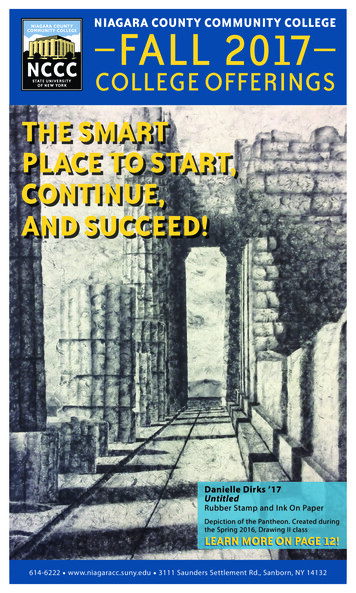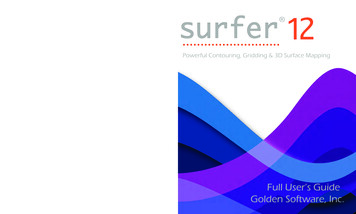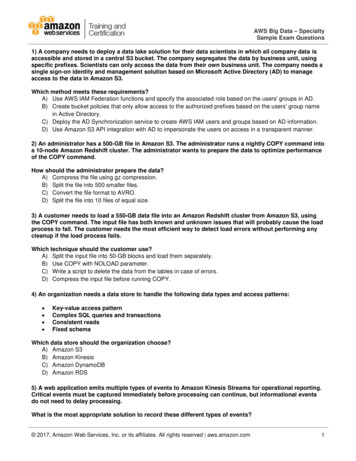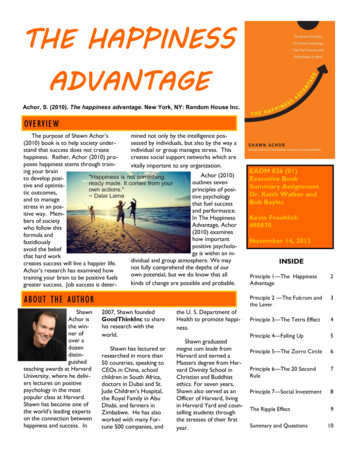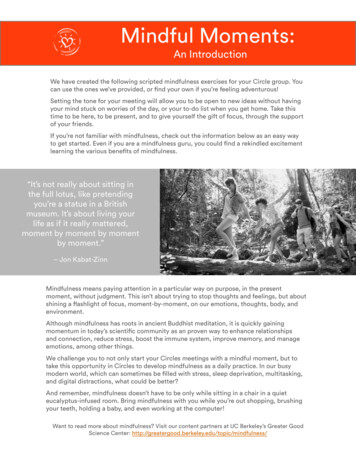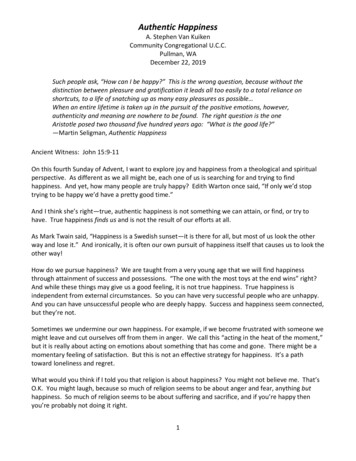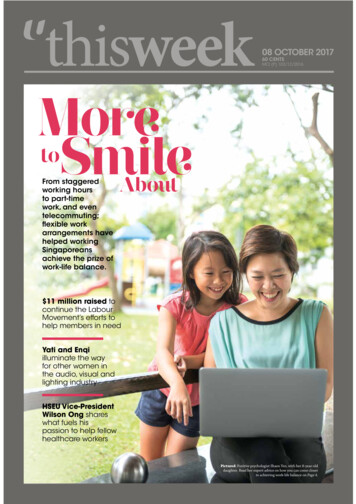
Transcription
08 OCTOBER 201760 CENTSMCI (P) 102/12/2016MoreSmiletoFrom staggeredworking hoursto part-timework, and eventelecommuting;flexible workarrangements havehelped workingSingaporeansachieve the prize ofwork-life balance.About 11 million raised tocontinue the LabourMovement’s efforts tohelp members in needYati and Enqiilluminate the wayfor other women inthe audio, visual andlighting industryHSEU Vice-PresidentWilson Ong shareswhat fuels hispassion to help fellowhealthcare workersPictured: Positive psychologist Shaen Yeo, with her 8-year-olddaughter. Read her expert advice on how you can come closerto achieving work-life balance on Page 4.
2 FLEXIBLE WORK ARRANGEMENTSNTUC This Week 08 OCTOBER 2017FlexibleWorkplaces,HappySWorkersMore workers can look forward toflexible work arrangements with thelaunch of a new Tripartite Standard.By Fawwaz Bakteeecond Minister for Manpower Josephine Teo officially launched theTripartite Standard on Flexible Work Arrangements (FWAs) at a learningvisit to precision engineering firm Feinmetall on 6 October 2017.The new standard was jointly developed by the Ministry of Manpower(MOM), NTUC, and the Singapore National Employers Federation.According to MOM, there are currently more than 250 companies thathave committed to the latest standard. Local small- and medium-sizedenterprises make up at least one in five of these early adopters.More than 210,000 employees of the standard's early adopters are able tobenefit from FWAs.WIN-WIN FOR ALLIn his latest blog post on labourbeat.org titled “Workplace Flexibility: TheX factor to the Way We Work”, NTUC Champion for Women and FamilyDesmond Choo said that FWAs could achieve a win-win situation for bothemployers and employees.“Workplace flexibility does not make for a choice employer, but it is acrucial pillar. Besides improved customer satisfaction and productivity, theyalso gain access to a larger pool of talent. In an economy where talent is king,access is a real competitive advantage.“For employees, the benefits of FWAs can include significantly improvedwork-life harmony, increased satisfaction at work and enhanced well-being.When employees feel that flexibility is available to them, it improves workingconditions, morale is higher, absenteeism is lower, and productivity is greater,”he said.Commenting on the standard, Mr Choo said: “With the launch of theTripartite Standard on FWAs, more companies can take that crucial first steptowards becoming an employer of choice. The Labour Movement will be everready to help such companies co-develop talent and work-life strategies for anengaged and happy workforce of tomorrow.”The Tripartite Alliance for Fair and Progressive Employment Practices(TAFEP) is currently working with tripartite partners to get more employersto adopt the new standard. Companies that do so will be listed on TAFEP’swebsite and can use a logomark for their recruitment and marketing efforts.TAFEP is also conducting workshops to help companies meet therequirements of the standard.MORE TO COMEThe Tripartite Standard on FWAs is the second standard to be rolled out, afterthe one for term contract employees was launched in late July this year. MOMadded that more standards will be launched in the months to come.As highlighted by Manpower Minister Lim Swee Say in March this year,standards fill the gap between employment laws which require all employersto comply, and advisories which provide a reference guide for all employers onbest practices.Employers interested in adopting this new standard can visit tafep.sg orcontact TAFEP at ts@tafep.sg.Key features of Tripartite Standards:123Comprises a set of verifiable and actionable practices in a specific areaof employment.Complements laws, Tripartite Guidelines and Tripartite Advisories to forma holistic framework for employment practices.Organisations who adopt the Tripartite Standards will enjoy publicrecognition through: Being listed on TAFEP’s website as a progressive company. The inclusion of relevant Tripartite Standards logomarks in theirmarketing collaterals.
NTUC This Week 08 OCTOBER 2017Flexi-workA Plus for NursesIt is really not easy for workingmothers to balance their workand caregiving roles, but NUH ismaking things a little easier withflexible work arrangements.By Ramesh SubbaramanIn 2014, senior nurse educator Teh Cheng Leng hadmulled over quitting her job to take care of her 3-yearold son.Thanks to flexible work arrangements at the NationalUniversity Hospital (NUH), Ms Teh was able to keep herjob and see to her child’s needs.PART-TIME WORKThe 46-year-old’s job in the last seven years has been toconduct in-house training programmes and guide nurseson the ground.Three years ago, when she enrolled her son into achildcare centre near her home, he had adjustmentproblems and cried often.To try to improve the situation, she decided toregister him at the childcare centre at NUH.Ms Teh also requested to work part-time so that shecould return home with her child in the afternoon.“It was a win-win situation for my child, my work andmyself. The part-time arrangement was very helpful asmy son was able to tide over the period and adjust betterto the new childcare environment. Instead of quitting myjob, my boss said, ‘why don’t you try this’, and it helped,”said Ms Teh who subsequently went back to full-timework after putting her son in full-day care.FLEXIBLE WORK ARRANGEMENTSMs Teh believes having flexible work arrangements innursing is important as majority of the workers in thissector are women.“We have to play many roles in the family, among themmother and caregiver of our parents. With a flexible workarrangement, we fulfil our career needs as well as our roleat home. That is very important,” said Ms Teh.Touching on the topic, NUH said that with the ageingpopulation and an increasing shortage of healthcareprofessionals locally, retaining talent is important.Currently, a number of its re-employed staff are onpart-time employment and such employees continue toenjoy similar benefits such as annual leave and medicalbenefits.Getting More out of LifeWe hear from an individual how flexible workarrangements have allowed her to live life to the fullest.Story and Photo by Avelyn NgThanks to the implementation of flexiblework arrangements at elevator andescalator solutions provider KONE twoyears ago, early riser Mathilda Chua can chooseto work from 7.30am to 5pm daily. Employeescan choose to start work up to one and a halfhours later.According to Ms Chua, 56, a senior draftingengineer, the move has greatly improved thequality of her work day.“Commuting to work during off-peak hoursis more pleasant. Once I reach the office, I amalso able to clear my e-mails and prepare mytask list before I’m bombarded with requestsfrom clients or colleagues. With better timemanagement, naturally there is less overtimeas well.“As long as the job scope allows, deadlinesare met, and the employee remains responsive,flexible work arrangements should not be aproblem,” she said.Being able to leave work earlier has allowedMs Chua to attend religious gatherings ather regular church, participate in communityworkout sessions and dine with her family –something she was unable to do in the past.FLEXIBLE WORK ARRANGEMENTS 3ADOPTING BEST PRACTICESKONE has nearly 400 employees, 160 ofwhich are based in the office. Currently,about 20 per cent of them are on theFlexiTime scheme with staggered hourslike Ms Chua. Eligible employees from thesales team, meanwhile, are entitled to theFlexiPlace scheme, where they can work fromhome for up to two days a month.Before formalising these human resourcepolicies, KONE consulted the SingaporeIndustrial and Services Employees' Union(SISEU) and also sent relevant departmentrepresentatives for a course at NTUC’se2i (Employment and EmployabilityInstitute) to learn more about flexible workarrangements."SISEU is pleased to work with KONE increating a family-friendly work environmentfor its employees through the WorkPro WorkLife Grant. We believe this will empower ourworking people to better manage their workand family responsibilities. We encouragemore employers to adopt such progressivepractices,” said SISEU General SecretaryPhillip Lee.
4 FLEXIBLE WORK ARRANGEMENTSNTUC This Week 08 OCTOBER 2017Lessonsfrom a Work-LifeStrategistPositive psychology is the scientific studyof the strengths that enable individualsand communities to thrive. So what canwe learn from it to lead a more balancedlife? We speak to an expert to find out.By Fawwaz BakteeBesides being an entrepreneur, a positivepsychologist, and a work-life strategist,Shaen Yeo, 36, is also a mother of two whoknows the impact flexible work arrangementscan have on employees.Shaen was the wellness director at NUS-Yale,where she was on a flexible work arrangementbefore moving on to set up Positive Education –a company that equips teachers and parents withthe mindset, tools and skills to help childrenflourish.She also teaches positive psychology toprofessionals interested to apply it in theirpersonal and professional lives.We recently met up with her to get hertake on flexible work arrangements and howindividuals can better balance work and life.NTUC This Week: What is your opinion onflexible work arrangements and its impacton employees?Shaen Yeo: For many employees, it is importantto have the option of flexible work arrangements,especially those with young children and elderlyparents. Employees will feel more empowered ifthey have a choice. When I speak to people whofeel stuck at work, the sentiment is that they arefrustrated and are continually working againstrigid boundaries.When employers give the option of flexiblework arrangements, it helps to lower their stresslevels. When you know you can knock-off workearlier to attend to your family or even buy sometime for yourself, your stress levels will drop andyou will ultimately be happier.I think employees who have access to thiswill look at their employers with a lot moreappreciation, as they will know that their bossesdon’t think of them as robots but as humanbeings trying to do their best.What advice do you have for workers whostruggle with work-life balance?You must be very present. Be present at workand home. When I say present, I don’t mean justphysically, but mentally. This makes you moreproductive.Being present means that you are focused ondoing one thing at a time. When you are thinkingof everything at work and home, your mind willgo into overdrive. This will lead to burnout as youare thinking about things in the past, or thingsthat have yet to come.When you are present with your family, theywill start feeling that you care about them. Andwhen you are present at work, your bosses andcolleagues will see that you care about the work.Apart from providing flexible workarrangements, what more can employers dofor the well-being of their employees?Employers need to empathise and understandthat everyone has different life situations. Soinstead of a one-size-fits-all approach such as rigidworking hours, it would be good to speak to theemployees and assess what their expectationsare. At the same time, [employers should]convey the expectations that they have of [theirstaff]. Employers and employees must workin partnership instead of both parties makingassumptions that may lead to misunderstandings.Giving positive affirmation can also help.Don’t just say, ‘Good job, well done’, but notice thegood work and share this with them in a timelyand personal way. Employees will appreciatethese gestures and will feel a sense of belongingto the workplace. Employees will feel they arecontributing to the company and will likelyremain loyal.
NTUC This Week 08 OCTOBER 2017CARE & SHARECharity Beginsat HomeLow-income union members are setto benefit as the NTUC-U Care Fundgarners 10.895 million this year.By Fawwaz BakteeThe Labour Movement revealed the amount at its annual NTUCU Care Charity Dinner on 4 October 2017, which will go towardsassisting low-income union members and families through itsvarious assistance programmes.At the event, NTUC Secretary-General Chan Chun Sing hosted some850 guests, comprising union leaders, management partners, U Carebeneficiaries and corporate donors.A total of 168 donors contributed to the NTUC-U Care Fund this year.All 60 NTUC-affiliated unions and associations supported the fund to thetune of 429,933.“It is indeed very heart-warming to see so many donors open up theirhearts to support the worthy cause of helping our low-income unionmembers and their families year after year. It is with their strong supportthat we have been able to touch many lives, and we certainly hope tocontinue doing so for many more years to come,” said NTUC AssistantSecretary-General Zainal Sapari, who is also director of NTUC’s Care andShare Department.Since its inception in 2009, the NTUC-U Care Fund has raised 109.66 million.ASSISTANCE PROGRAMMESThis year, the fund has set aside 2.675 million and 3.8 million for theNTUC U Stretch vouchers and U Care Back To School (BTS) vouchersrespectively. The U Stretch vouchers will help some 31,500 low-incomeunion members defray their daily living expenses, while the U Care BTSvouchers will benefit 30,400 union members’ school-going children.“As a single mother with three young children aged 9, 7 and 4, I amvery thankful for the assistance provided by the NTUC-U Care Fund.My youngest daughter has been diagnosed with chronic kidney failureand requires long-term medication. Without the U Stretch vouchers tobuy groceries and Back To School vouchers to purchase stationery andassessment books for my children, I would have to fork out even more ofmy own money,” said 33-year-old Salina Masri Khan (pictured above), whohas been a beneficiary of the fund since 2015.Other assistance programmes include the U Care Education Co-FundingScheme and U Care Caring Sharing Reaching out (CSR) Grant.SUPPORT FOR ELDERLY, PRESCHOOLERSThe event also saw 750,000 presented to the Bright Horizons Fund tosu
Yati and Enqi illuminate the way for other women in the audio, visual and lighting industry HSEU Vice-President Wilson Ong shares what fuels his passion to help fellow healthcare workers About to More Smile Pictured: Positive psychologist Shaen Yeo, with her 8-year-old daughter. Read her expert advice on how you can come closer to achieving work-life balance on Page 4. S econd Minister for .
